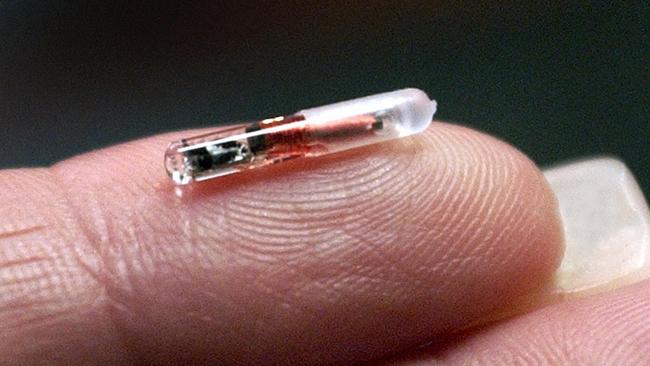Swedish company Epicenter implants microchips into employees
EVERYTHING from toilet breaks to what they eat for lunch is recorded at this company that has implanted staff with tiny microchips under the skin.

SOME workers have been implanted with microchips that allow the companies that employ them to track their every move.
Swedish company Epicenter will embed a chip into about 150 workers, so bosses can monitor toilet breaks and how long they work.
The workers volunteered to have the microchip, which is about as big as a grain of rice, implanted for free.
Patrick Mesterton, co-founder and chief executive of Epicenter, an innovation and technology company, told the ABC the microchips inserted into employees’ hands would simplify life.
With the radiofrequency identification chip, they’ll be able to open doors and use office technology like photocopiers and it can even pay for lunch at the office cafe.
“You can do airline fares with it, you can also go to your local gym ... so it basically replaces a lot of things you have other communication devices for, whether it be credit cards, or keys, or things like that.”
Two years ago, Mr Mesterton told news.com.au many of Epicentre’s employees had already been chipped and used the technology in their everyday life.
“It’s an implant in the hand that enables them to digitise professional information and communicate with devices both personal and within Epicenter. Once ‘chipped’ with this technology, members can interact with the building with a simple swipe of the hand. Chips can also be programmed to hold contact information and talk to smartphone apps,” he said.

These types of microchips have been used in humans and animals before and means people don’t need to keep track of multiple passwords and PINs because it will all be installed on the inserted chip.
Emilott Lantz had a microchip implanted under her skin about three years ago and told Swedish newspaper The Local it wasn’t the future.
“This is the present. To me, it’s weird that we haven’t seen this sooner.”
Mr Mesterton told the ABC the idea wasn’t that far-fetched, as people had been implanting devices under their skin for decades, including things like pacemakers.
“That’s a way, way more serious thing than having a small chip that can actually communicate with devices,” he said.
Microbiologist Ben Libberton, from Swedish university Karolinska Institute, told the ABC the chip could compromise security and hold a lot of private information.
“Conceptually you could get data about your health, and you could [get] data about your whereabouts, how often you’re working, how long you’re working, if you’re taking toilet breaks and things like that,” he said.
“All of that data could conceivably be collected.
“So then the question is: What happens to it afterwards? What is it used for? Who is going to be using it? Who is going to be seeing it?”



